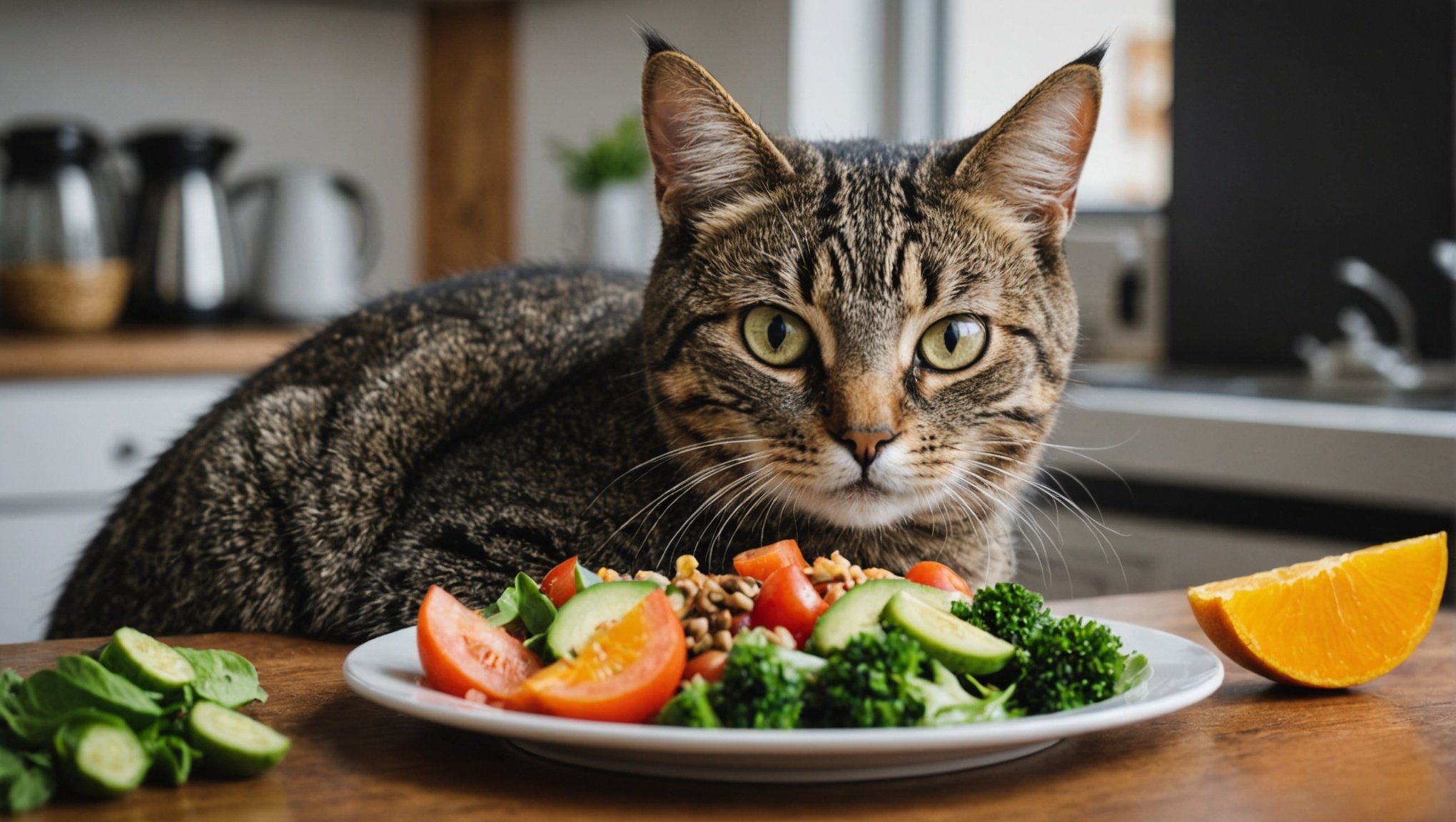Understanding Hyperthyroidism in Cats
Hyperthyroidism in cats is a prevalent endocrine disorder primarily affecting middle-aged and older felines. This condition arises when the thyroid gland, located in the cat’s neck, produces excess thyroid hormones. These hormones significantly impact a cat’s metabolism, causing various physiological changes.
One of the early symptoms to be mindful of is weight loss despite an increased appetite. This paradox occurs because the rampant hormones escalate the metabolic rate, leading cats to burn more calories than they intake. Other common symptoms include hyperactivity, excessive thirst and urination, and a rough or unkempt coat. Some cats also experience vomiting and diarrhoea. Recognising these signs early can facilitate timely intervention.
Additional reading : Creating a safe and enriching habitat for your reptile companions: the ultimate handbook
Veterinarians employ several methods to achieve an accurate diagnosis of hyperthyroidism in cats. An initial physical examination may reveal a palpable enlargement of the thyroid gland. Blood tests are vital, measuring levels of thyroxine (T4), the hormone produced by the thyroid. Elevated T4 levels typically confirm the diagnosis. Furthermore, additional tests such as scintigraphy can help assess how the thyroid gland functions and determine whether treatment is required.
Understanding the intricacies of hyperthyroidism in cats, coupled with prompt identification of symptoms and seeking a precise diagnosis, can notably improve a cat’s quality of life through treatment.
In the same genre : Tailored Exercise Plans for Pomeranians with Luxating Patella: Achieving Optimal Health and Mobility
Nutritional Needs of Hyperthyroid Cats
Understanding the dietary needs of hyperthyroid cats is crucial. With their heightened metabolism, these cats require a balanced diet that meets their specific nutrient requirements. Ensuring this can contribute greatly to managing their condition.
A primary focus should be on a nutrient-dense diet. Protein, for instance, is critical because it supports muscle maintenance despite the increased metabolic rate. High-quality animal proteins are particularly beneficial, promoting muscle health and overall vitality. Equally important is the inclusion of fiber, which aids digestion and helps manage appetite fluctuations commonly observed in hyperthyroid cats.
When discussing specific macronutrient ratios, these play a pivotal role in crafting a diet that supports optimal health. A balance where protein is elevated, while carbohydrates are more limited, is often recommended. This helps meet energy needs without exacerbating the issues related to the condition.
In addition to proteins and fiber, maintaining hydration is essential. Wet food diets can be advantageous as they provide necessary moisture, assisting in maintaining kidney function and enhancing nutrient absorption. Furthermore, supplementation with vitamins such as B-complex may be beneficial, helping to counteract vitamin depletion caused by increased metabolic demands.
By addressing these dietary needs, owners can better support the health of hyperthyroid cats, ensuring they receive a balanced, nutrient-rich diet tailored to their condition.
Food Recommendations for Hyperthyroid Cats
Deciding on a diet for a hyperthyroid cat requires careful consideration of their specific nutritional needs to manage their condition effectively. Both suitable foods and the method of preparation play crucial roles in their health.
Commercial Diets Recommendations
Commercial diets designed for hyperthyroid cats offer the convenience of a ready-made solution. These diets are formulated to control iodine intake, which is essential in managing thyroid hormone production. Many reputable brands offer commercial diets that are low in iodine, ensuring they meet the nutritional requirements without exacerbating the condition. The advantage of commercial diets includes consistency in nutrient levels, ease of preparation, and readily available formulations that specifically target hyperthyroid health concerns.
Homemade Diet Considerations
Home-prepared meals for hyperthyroid cats can be an alternative, allowing for precise control over ingredients and iodine levels. However, creating homemade diets that are balanced and meet all nutritional needs can be challenging. It’s essential to consult a veterinarian or a pet nutrition expert when opting for home-cooked meals. They can help in devising recipes that ensure adequate iodine regulation while providing all necessary nutrients. Consistency and monitoring are key to maintaining an effective homemade diet plan.
Brands to Consider for Hyperthyroid Cats
Several brands provide well-regarded commercial diets tailored for hyperthyroid cats. These trusted brands include options that have been clinically tested and have shown to help in managing thyroid levels effectively. Opting for brands with high-quality ingredients and a commitment to feline health ensures peace of mind when managing a hyperthyroid cat’s dietary needs.
Portion Sizes and Feeding Frequencies
Understanding portion control and maintaining a consistent feeding schedule are essential elements in effective weight management for pets. Properly determining portion sizes can help in preventing obesity, a common concern among pet owners.
To begin with, guidelines for portion sizes vary depending on an animal’s breed, age, size, and activity level. It’s often beneficial to consult a veterinarian for personalized advice, but general pointers include observing the pet’s body condition and adjusting the nutritional intake accordingly.
Establishing a regular feeding schedule can further aid in weight control and maintaining stable energy levels. This consistency not only aids digestion but also helps in monitoring food intake, ensuring your pet receives the right balance of nutrients.
Here are some tips to assist in managing your pet’s weight:
- Regularly monitor and adjust the calorie intake.
- Use measuring cups to offer precise portions.
- Avoid overfeeding with treats; they should not exceed 10% of the daily caloric intake.
Managing weight effectively through portion control and consistent feeding schedules is crucial for your pet’s health. By adhering to these guidelines, you can promote a healthier lifestyle and prevent obesity-related issues.
Supplementation for Hyperthyroid Cats
When managing hyperthyroidism in cats, nutritional supplements play a crucial role. These supplements can enhance the health and well-being of your feline friend by providing essential vitamins and minerals that may be lacking due to their condition. Notably, omega-3 fatty acids, antioxidants, and taurine are often recommended to support thyroid function and overall health.
Incorporating supplements into your cat’s diet should be done with caution. It’s essential to follow veterinary guidance to ensure that any additions to their diet are safe and beneficial for their specific health needs. Gradually introduce these supplements to prevent any adverse reactions or digestive issues and observe any changes in behaviour or appetite.
When choosing supplements, ensure they are veterinary-recommended products. These products are typically formulated to provide a balanced intake of nutrients tailored to your cat’s condition. Look for products validated by pet health organisations to ensure quality and efficacy.
Remember that supplements should complement other treatment plans and not replace prescribed medication. Regular veterinary check-ups are necessary to monitor your cat’s response and adjust supplementation as needed. Implementing a well-rounded approach can significantly impact the quality of life for hyperthyroid cats, promoting a healthier and more balanced life.
Meal Preparation Tips for Hyperthyroid Cats
Preparing meals for hyperthyroid cats demands attention to specific details to ensure their health and wellbeing. Employing effective meal prep strategies can simplify the process, making feeding time less stressful for both you and your feline companion.
Start by selecting high-quality, nutritionally balanced food that addresses the unique needs of hyperthyroid cats. Focus on feeding strategies that include consistent meal times and portion-controlled servings. This promotes a stable metabolic rate and helps manage symptoms associated with hyperthyroidism.
Incorporating a variety of food textures and flavors can also encourage eating, which is vital for maintaining their energy levels and body condition. Mixing wet and dry food, when appropriate, provides diversity and stimulates appetite.
Food safety is paramount. Ensure cleanliness by regularly washing bowls, utensils, and surfaces involved in meal preparation. Safely store all ingredients to prevent contamination. When preparing homemade meals, consult with a veterinarian to ensure that the diet meets all nutritional requirements without harmful imbalances.
Strategically organizing meals in advance can facilitate regular feeding schedules, giving you more time to focus on caring for your cat’s other needs. Consider using airtight containers to preserve food freshness and plan meals a week ahead to reduce daily preparation time. With these meal prep tips, feeding your hyperthyroid cat becomes a streamlined and safer experience.
Addressing Common Challenges
Navigating the world of feeding can be tricky with picky eaters and health issues such as hyperthyroidism. Understanding how to overcome feeding difficulties is essential for promoting a healthy lifestyle for your feline friend.
Strategies for Dealing with Picky Eaters
Dealing with picky eaters requires patience and creativity. One effective tactic is to offer a variety of foods by alternating flavours and textures. This not only helps maintain interest but can also uncover a new favorite! Introduce these new options gradually so they don’t overwhelm your cat.
Encouraging Appetite in Hyperthyroid Cats
Hyperthyroid cats often struggle with feeding difficulties due to an increased metabolism. To stimulate their appetite, try scheduling smaller, more frequent meals. This helps in managing their food intake without overwhelming them. Additionally, offering high-calorie and protein-rich diets can ensure they receive adequate nutrition.
Managing Health Concerns
Health concerns like dental issues or gastrointestinal disorders can further complicate feeding. Ensure regular vet check-ups to catch and address any problems early. If your cat continues to refuse food, there may be underlying issues that require veterinary attention. By taking these proactive steps, you can improve your cat’s diet effectively.
Addressing these challenges can significantly enhance your cat’s wellbeing, ensuring they maintain a balanced diet even in the face of difficulties.
Veterinary Insights on Cat Nutrition
Consulting with a veterinary specialist is crucial for ensuring your feline friend receives optimal nutrition. Regular veterinary advice helps pet owners understand their cat’s specific health needs, guiding dietary choices and helping maintain overall wellness. These consultations can pinpoint nutritional deficiencies, recommend appropriate food types, and assess the balance of proteins, fats, and carbohydrates in the cat diet.
Veterinary health checks play a significant role in this process. During these exams, veterinarians can evaluate a cat’s weight, coat condition, and energy levels, crucial indicators of nutritional health. Identifying these factors allows the vet to provide tailored dietary solutions, adjusting or enhancing the cat’s diet as needed.
For customized feeding plans, collaboration with your veterinarian is essential. During consultations, vets may suggest:
- Specific diets for particular health conditions or life stages
- Portion sizes based on activity level and metabolic rate
- Supplements if there are any nutritional gaps
By working closely with a veterinary professional, owners can ensure they are meeting their cat’s unique nutritional requirements, thereby enhancing their pet’s quality of life. Thus, seeking veterinary advice is not just about addressing immediate concerns but investing in the long-term health of your pet.







